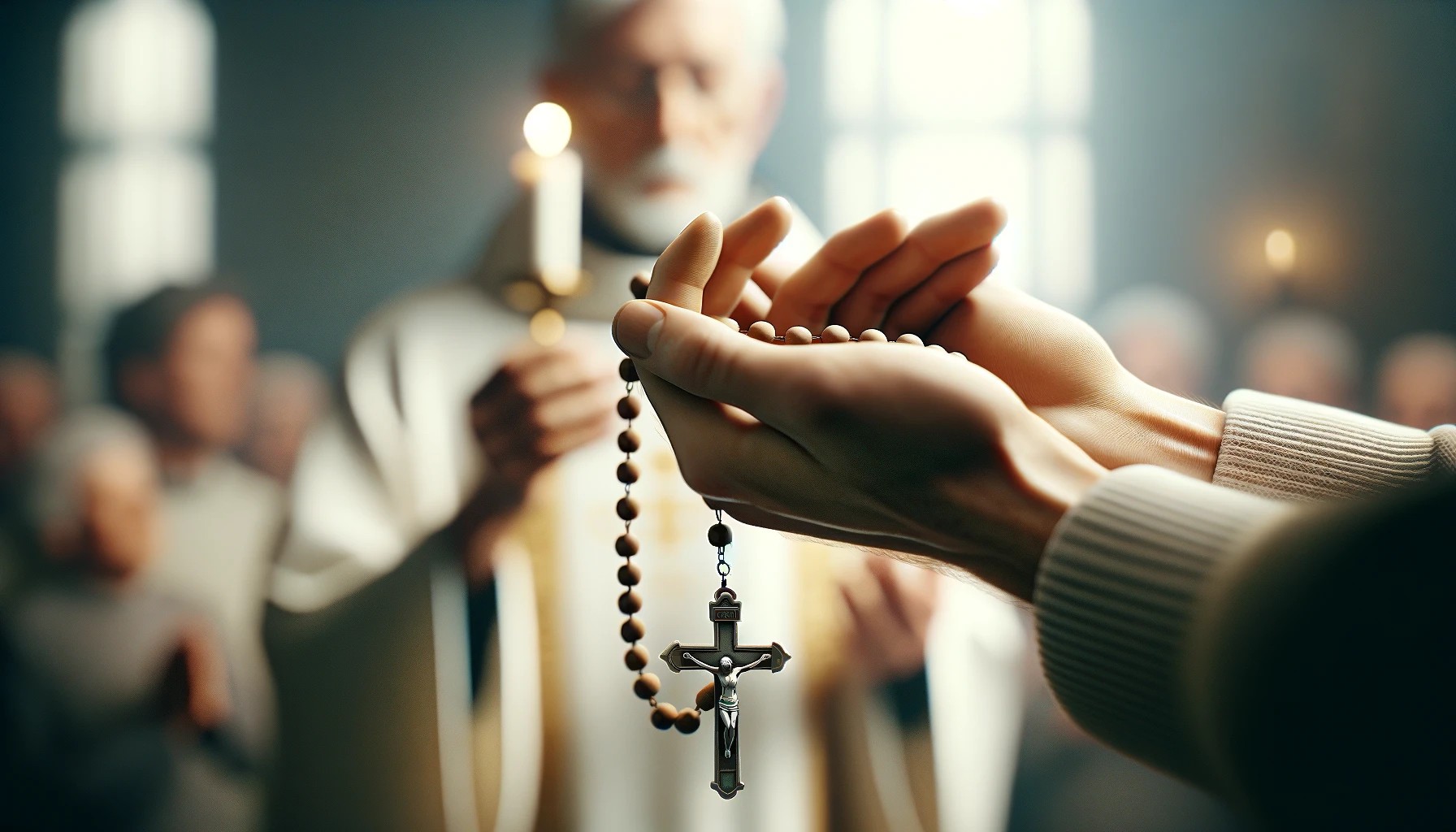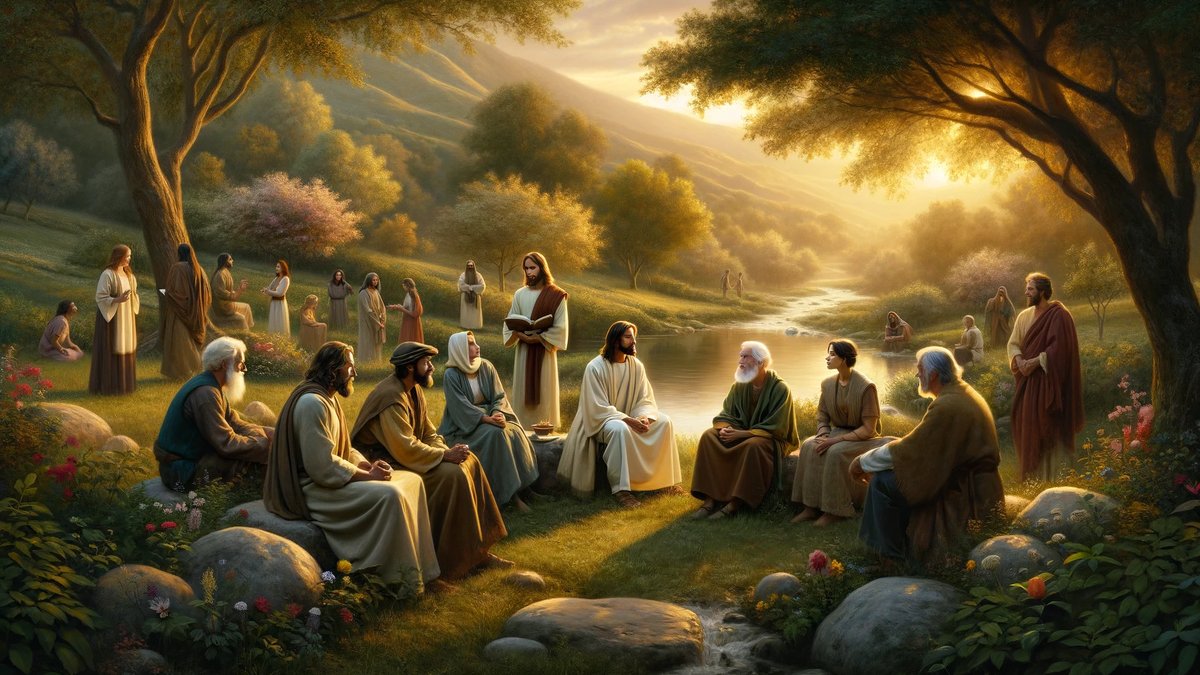Home>Theology and Spirituality>Why Do We Receive Communion On Good Friday


Theology and Spirituality
Why Do We Receive Communion On Good Friday
Published: February 25, 2024
Ericka Andersen, an editor at Christian.net, expertly merges digital strategy with content creation, focusing on faith and societal issues. Her communication skills enhance the platform's engaging narratives, fostering meaningful dialogue on belief's impact on society.
Discover the significance of receiving communion on Good Friday and its connection to theology and spirituality. Explore the deeper meaning behind this sacred tradition.
(Many of the links in this article redirect to a specific reviewed product. Your purchase of these products through affiliate links helps to generate commission for Christian.net, at no extra cost. Learn more)
Table of Contents
Introduction
Good Friday is a solemn and significant day in the Christian calendar, commemorating the crucifixion of Jesus Christ and his ultimate sacrifice for humanity. It is a time for deep reflection, repentance, and gratitude for the immense love and grace demonstrated through Christ's selfless act. One of the central practices observed on Good Friday is the reception of communion, also known as the Eucharist or the Lord's Supper. This sacred ritual holds profound spiritual meaning for believers and serves as a poignant reminder of the events that unfolded on that fateful day.
Receiving communion on Good Friday is a deeply meaningful and symbolic act for Christians around the world. It is a time when the faithful come together to partake in the bread and wine, representing the body and blood of Jesus Christ, and to remember the sacrifice that brought forth redemption and eternal life. The act of communion on this day serves as a powerful expression of faith, unity, and reverence for the profound significance of Christ's crucifixion.
As we delve into the significance of Good Friday and the profound meaning of communion, it becomes evident that the connection between these two elements runs deep within the fabric of Christian theology and spirituality. Understanding the biblical basis for receiving communion on Good Friday and the spiritual benefits it offers allows us to appreciate the richness of this tradition and its transformative impact on the lives of believers.
In the following sections, we will explore the profound significance of Good Friday, the deep spiritual meaning of communion, and the intricate connection between these two pillars of Christian faith. By delving into the biblical foundation and the spiritual nourishment that communion provides, we can gain a deeper understanding of why receiving communion on Good Friday holds such profound significance for Christians worldwide.
Read more: Why Do We Receive The Holy Communion
The Significance of Good Friday
Good Friday holds immense significance in the Christian faith as it marks the crucifixion of Jesus Christ, a pivotal event that embodies the core of Christian theology and spirituality. This solemn day is observed with reverence and introspection, serving as a poignant reminder of the profound sacrifice made by Jesus for the redemption of humanity.
The significance of Good Friday lies in the unparalleled demonstration of love and selflessness exhibited by Jesus Christ. His willingness to endure unimaginable suffering and ultimately lay down his life on the cross stands as the ultimate expression of divine grace and compassion. Through his crucifixion, Christians believe that Jesus atoned for the sins of humanity, offering a path to reconciliation with God and the promise of eternal life.
Good Friday also serves as a powerful symbol of hope and redemption. The crucifixion, though a harrowing and agonizing event, is inseparable from the subsequent triumph of the resurrection. The profound significance of Good Friday is illuminated by the transformative narrative of Christ's death and resurrection, signifying the victory over sin and death and the restoration of humanity's relationship with God.
Moreover, Good Friday invites believers to contemplate the depth of Christ's sacrifice and the immeasurable love that compelled him to endure such suffering. It prompts introspection and repentance, encouraging individuals to confront their own shortcomings and seek spiritual renewal. The somber atmosphere of Good Friday creates a space for profound reflection, fostering a deep sense of gratitude for the redemptive grace made available through Christ's sacrifice.
In essence, the significance of Good Friday lies in its embodiment of the core tenets of the Christian faith: love, redemption, and the promise of new life. It serves as a poignant reminder of the profound depth of God's love for humanity and the transformative power of Christ's sacrifice. As Christians observe Good Friday, they are called to embrace the profound significance of this day and to reflect on the immeasurable impact of Christ's crucifixion on their faith and spiritual journey.
The Meaning of Communion
Communion, also known as the Eucharist or the Lord's Supper, holds profound significance within the Christian faith. At its core, communion represents a sacred and symbolic ritual that embodies the spiritual nourishment and unity of believers with Christ and with one another. The act of partaking in communion is deeply rooted in the teachings of Jesus Christ and has been upheld as a central sacrament within Christian traditions for centuries.
Central to the meaning of communion is the symbolic representation of the body and blood of Jesus Christ through the elements of bread and wine. This symbolic act traces its origins to the Last Supper, a poignant event in which Jesus shared a meal with his disciples before his crucifixion. During this meal, Jesus took bread, blessed it, broke it, and gave it to his disciples, declaring it to be his body. He then took the cup of wine, gave thanks, and offered it to his disciples, stating that it represented his blood, the blood of the new covenant.
The act of communion thus serves as a profound remembrance of Christ's sacrificial offering and the establishment of a new covenant between God and humanity. It symbolizes the spiritual sustenance and renewal that believers receive through their union with Christ. As Christians partake in the bread and wine, they are invited to reflect on the profound significance of Christ's sacrifice and to internalize the spiritual nourishment that it offers.
Furthermore, communion embodies the concept of unity and fellowship within the body of Christ. It serves as a communal act, bringing together believers from diverse backgrounds and experiences to partake in a shared expression of faith. The act of coming together to receive communion underscores the interconnectedness of believers and their shared identity as members of the Christian community.
The meaning of communion extends beyond a mere symbolic ritual; it encompasses a profound spiritual encounter with the living presence of Christ. Through the act of partaking in communion, believers affirm their faith in the redemptive work of Christ and experience a deep sense of spiritual communion with the divine. It serves as a transformative moment of encounter with the grace and love of God, fostering spiritual renewal and strengthening the bond between the believer and their Savior.
In essence, the meaning of communion encompasses spiritual nourishment, remembrance of Christ's sacrifice, unity within the Christian community, and a profound encounter with the living presence of Christ. It stands as a central sacrament that encapsulates the core tenets of the Christian faith and serves as a source of profound spiritual enrichment for believers throughout the ages.
The Connection Between Good Friday and Communion
The connection between Good Friday and communion is deeply rooted in the foundational elements of Christian faith and theology. Good Friday, as the day of Christ's crucifixion, holds profound significance as the culmination of Jesus' earthly ministry and the ultimate expression of divine love and sacrifice. Communion, on the other hand, symbolizes the spiritual nourishment and unity of believers with Christ and with one another, embodying the remembrance of Christ's sacrificial offering and the establishment of a new covenant.
At the heart of the connection between Good Friday and communion lies the profound symbolism of Christ's sacrifice and the redemptive grace made available to humanity. The events of Good Friday, culminating in the crucifixion of Jesus Christ, serve as the pivotal moment in Christian theology, representing the atonement for the sins of humanity and the reconciliation between God and humankind. The act of communion, with its symbolic representation of Christ's body and blood, serves as a poignant remembrance of the sacrificial offering made by Jesus on the cross, thereby establishing a profound connection between the two.
Moreover, the Last Supper, where Jesus instituted the practice of communion, holds intrinsic connections to the events of Good Friday. It was during this significant meal that Jesus shared bread and wine with his disciples, instructing them to partake in remembrance of him. The symbolism of the bread as his body and the wine as his blood, representing the impending sacrifice on the cross, underscores the intimate connection between the Last Supper and the crucifixion. Therefore, the act of communion becomes intricately linked to the events of Good Friday, serving as a tangible and sacred expression of the redemptive grace and sacrificial love demonstrated on that fateful day.
Furthermore, the spiritual significance of communion on Good Friday extends to the profound sense of unity and fellowship it fosters among believers. As Christians come together to partake in communion on this solemn day, they are united in their remembrance of Christ's sacrifice and their shared identity as recipients of God's grace. The act of communal participation in communion underscores the interconnectedness of believers and their collective affirmation of faith in the redemptive work of Christ, thereby strengthening the bonds of Christian community and solidarity.
In essence, the connection between Good Friday and communion is deeply profound and multifaceted. It intertwines the sacrificial love demonstrated on Good Friday with the spiritual nourishment and unity symbolized in the act of communion, creating a sacred bond that resonates at the core of Christian faith and spirituality. As believers partake in communion on Good Friday, they are invited to immerse themselves in the profound connection between Christ's sacrifice and the spiritual sustenance offered through the sacred ritual, thereby deepening their understanding of the transformative significance of this sacred tradition.
The Biblical Basis for Receiving Communion on Good Friday
The biblical foundation for receiving communion on Good Friday is deeply rooted in the teachings and events recorded in the New Testament, particularly in the accounts of the Last Supper and the significance of Christ's sacrificial offering on the cross. The Gospel narratives provide profound insights into the establishment of communion as a sacred practice and its intrinsic connection to the redemptive events of Good Friday.
In the Gospel of Matthew (26:26-28), the account of the Last Supper depicts Jesus taking bread, blessing it, and giving it to his disciples, declaring, "Take, eat; this is my body." He then took the cup, gave thanks, and offered it to them, saying, "Drink from it, all of you; for this is my blood of the covenant, which is poured out for many for the forgiveness of sins." This pivotal moment during the Last Supper signifies the institution of communion by Jesus Christ, wherein he symbolically imparted the significance of his impending sacrifice on the cross through the elements of bread and wine.
The Gospel of Mark (14:22-24) and the Gospel of Luke (22:19-20) similarly recount the events of the Last Supper, emphasizing the symbolic act of partaking in the bread and wine as a remembrance of Christ's body and blood, which would be offered for the forgiveness of sins. These accounts establish the foundational basis for the practice of communion, underscoring its profound significance as a tangible expression of Christ's sacrificial love and the establishment of a new covenant between God and humanity.
Furthermore, the Apostle Paul, in his first letter to the Corinthians (1 Corinthians 11:23-26), provides additional biblical insight into the significance of communion within the Christian community. He recounts the instructions given by Jesus during the Last Supper and emphasizes the solemn remembrance of Christ's sacrifice through the act of partaking in the bread and the cup. Paul's epistle reinforces the biblical basis for receiving communion as a sacred and communal practice that serves as a continual remembrance of Christ's redemptive work on the cross.
The biblical foundation for receiving communion on Good Friday is thus firmly established in the teachings and accounts preserved in the New Testament. The Last Supper, as a pivotal moment in the life of Jesus Christ, serves as the foundational basis for the practice of communion, linking it intimately to the sacrificial events of Good Friday. As Christians partake in communion on Good Friday, they do so in accordance with the biblical mandate to remember and proclaim the redemptive significance of Christ's sacrifice, thereby reaffirming their faith in the transformative power of the cross.
Read more: Why Do We Need To Take Communion
The Spiritual Benefits of Receiving Communion on Good Friday
Receiving communion on Good Friday holds profound spiritual benefits for believers, encompassing a transformative encounter with the redemptive grace of Christ and a deep sense of spiritual nourishment and renewal. As Christians partake in communion on this solemn day, they are invited to immerse themselves in the profound significance of Christ's sacrifice and to experience the transformative power of this sacred ritual.
One of the spiritual benefits of receiving communion on Good Friday is the profound sense of connection and intimacy with the living presence of Christ. Through the act of partaking in the bread and wine, believers encounter a tangible expression of Christ's sacrificial love and the redemptive grace made available through his sacrifice on the cross. This encounter fosters a deep sense of spiritual communion with the divine, allowing individuals to experience a profound closeness to Christ and a renewed awareness of his abiding presence in their lives.
Furthermore, receiving communion on Good Friday serves as a moment of profound spiritual reflection and introspection. As believers partake in the symbolic elements of bread and wine, they are invited to reflect on the depth of Christ's sacrifice and the immeasurable love that compelled him to endure the cross for the redemption of humanity. This introspective journey prompts individuals to confront their own shortcomings, seek spiritual renewal, and express gratitude for the redemptive grace extended to them through Christ's sacrifice.
Moreover, the act of communal participation in communion on Good Friday fosters a deep sense of unity and fellowship within the Christian community. As believers come together to partake in this sacred ritual, they are united in their remembrance of Christ's sacrifice and their shared identity as recipients of God's grace. This communal expression of faith strengthens the bonds of Christian solidarity and reinforces the interconnectedness of believers in their journey of faith and spiritual growth.
Receiving communion on Good Friday also offers spiritual nourishment and sustenance for the believer's journey. The act of partaking in the bread and wine symbolizes the spiritual nourishment and renewal that believers receive through their union with Christ. It serves as a transformative moment of encounter with the grace and love of God, fostering spiritual renewal and strengthening the bond between the believer and their Savior.
In essence, the spiritual benefits of receiving communion on Good Friday encompass a profound encounter with the redemptive grace of Christ, a deep sense of spiritual communion and intimacy, introspective reflection, communal unity, and spiritual nourishment. As believers partake in this sacred ritual, they are invited to embrace the transformative power of Christ's sacrifice and to experience the profound spiritual enrichment that communion offers for their faith journey.
Conclusion
In conclusion, the act of receiving communion on Good Friday holds profound significance within the Christian faith, intertwining the solemn remembrance of Christ's sacrificial offering with the spiritual nourishment and unity symbolized in the sacred ritual of communion. Good Friday stands as a poignant reminder of the immeasurable love and selflessness demonstrated by Jesus Christ through his crucifixion, marking a pivotal moment in Christian theology and spirituality. The events of Good Friday, culminating in the crucifixion and the subsequent triumph of the resurrection, embody the core tenets of the Christian faith: love, redemption, and the promise of new life.
Communion, on the other hand, represents a sacred and symbolic ritual that embodies the spiritual nourishment and unity of believers with Christ and with one another. The act of partaking in communion serves as a profound remembrance of Christ's sacrificial offering and the establishment of a new covenant between God and humanity. It symbolizes the spiritual sustenance and renewal that believers receive through their union with Christ, fostering a deep sense of spiritual communion with the divine.
The connection between Good Friday and communion runs deep within the fabric of Christian theology and spirituality. The Last Supper, where Jesus instituted the practice of communion, holds intrinsic connections to the events of Good Friday, underscoring the intimate link between the two. The act of communal participation in communion on Good Friday fosters a deep sense of unity and fellowship within the Christian community, strengthening the bonds of Christian solidarity and reinforcing the interconnectedness of believers in their journey of faith and spiritual growth.
The biblical foundation for receiving communion on Good Friday is firmly established in the teachings and events recorded in the New Testament, emphasizing the profound significance of communion as a tangible expression of Christ's sacrificial love and the establishment of a new covenant between God and humanity. As Christians partake in communion on Good Friday, they do so in accordance with the biblical mandate to remember and proclaim the redemptive significance of Christ's sacrifice, thereby reaffirming their faith in the transformative power of the cross.
Receiving communion on Good Friday offers profound spiritual benefits, including a transformative encounter with the redemptive grace of Christ, a deep sense of spiritual communion and intimacy, introspective reflection, communal unity, and spiritual nourishment. As believers partake in this sacred ritual, they are invited to embrace the transformative power of Christ's sacrifice and to experience the profound spiritual enrichment that communion offers for their faith journey.
In essence, the act of receiving communion on Good Friday serves as a poignant expression of faith, unity, and reverence for the profound significance of Christ's crucifixion. It invites believers to immerse themselves in the profound connection between Christ's sacrifice and the spiritual sustenance offered through the sacred ritual, thereby deepening their understanding of the transformative significance of this sacred tradition.














